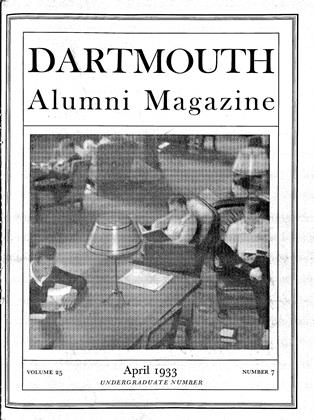Breaking most of the existing scholastic records of freshman classes during the first semester, the class of 1936 has established itself scholastically as one of the most brilliant freshman classes which have ever entered Dartmouth. This outstanding accomplishment by the first-year men is indicative of the success of the Selective Process in choosing from the large number of applicants for admission a group that, with very few exceptions, is capable of carrying the college program of courses successfully.
Although only one freshman attained a perfect average of 4.0, 58 men secured a B average (3.0), as compared with 41 as shown in the average for the freshman classes for the past ten years. Only five men, out of a class that totaled 637 in September, were separated at the end of the first semester because of scholastic failures. The average number of students suspended at this time in the previous 10 years is 15.
Only 32 men failed to pass two or more courses as compared with an average of 59 men in the preceding decade, while 527 members of the class passed all five courses, the ten-year average being 455. Before the introduction of the Selective Process the number of students passing all courses the first semester was about 380.
The Selective Process, which is largely responsible for the superior calibre freshman now admitted to the College, was inaugurated in 1922. Many mechanical changes in the operation of the plan have been made since that time, information blanks have been steadily improved, alumni interviews have been made a more integral part of the scheme, and closer cooperation established in the plan's operation between the College and the secondary schools. More recently the adoption of the "Junior Selections" plan has become one of the most important developments in the history of the Selective Process.
 View Full Issue
View Full Issue
More From This Issue
-
 Article
ArticleDARTMOUTH MEN IN AVIATION
April 1933 By Carroll A. Boynton '33 -
 Class Notes
Class NotesClass of 1910
April 1933 By Harold P. Hinman -
 Article
ArticleHANOVER BROWSING
April 1933 By Rees Higgs Bowen -
 Article
ArticleNorthern April PART ONE
April 1933 -
 Class Notes
Class NotesClass of 1902
April 1933 By Hermon W. Farwell -
 Article
ArticleTHE UNDERGRADUATE CHAIR
April 1933 By J. S. Monacan'33.







